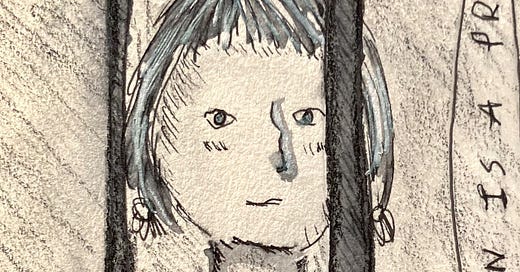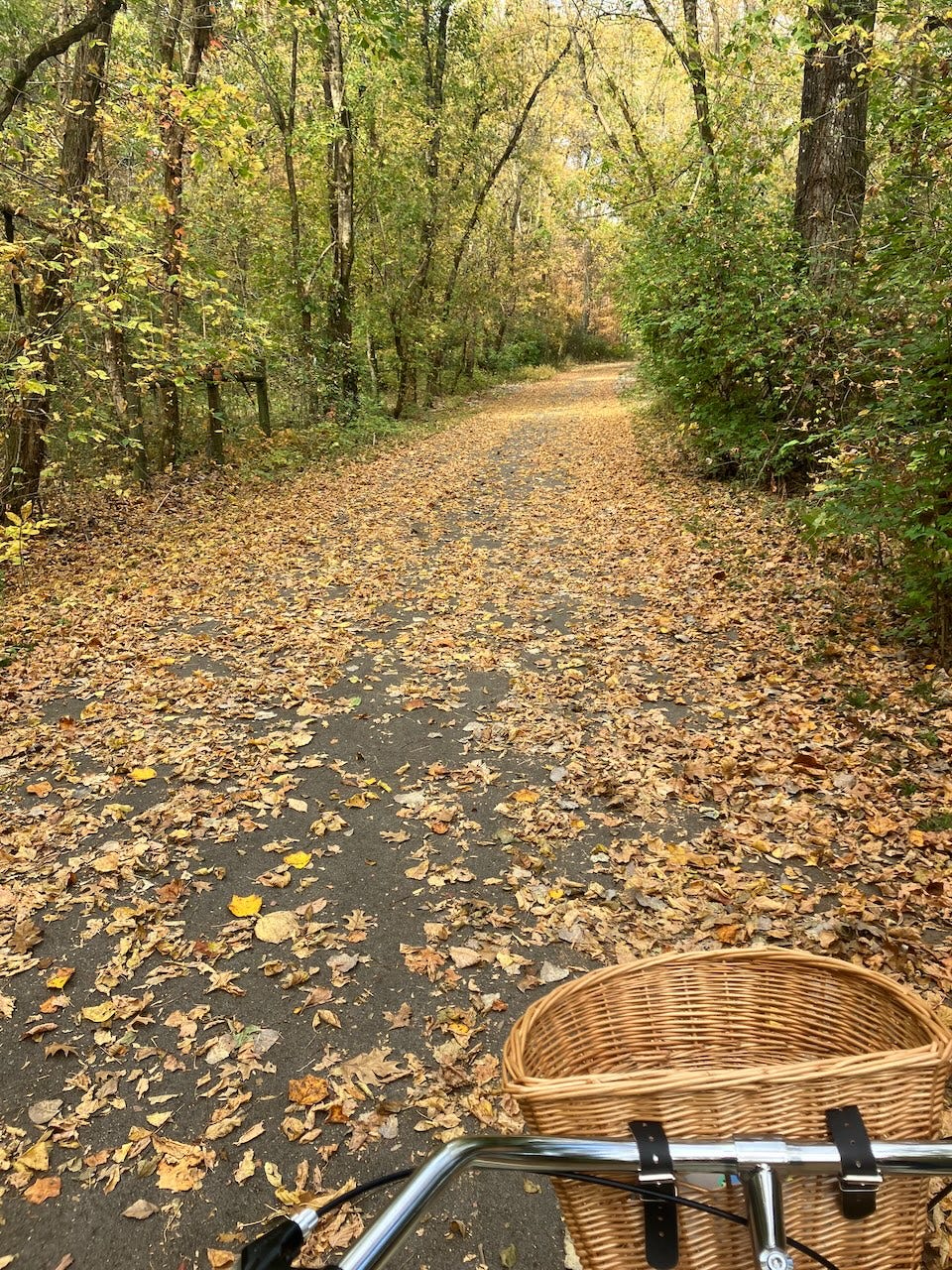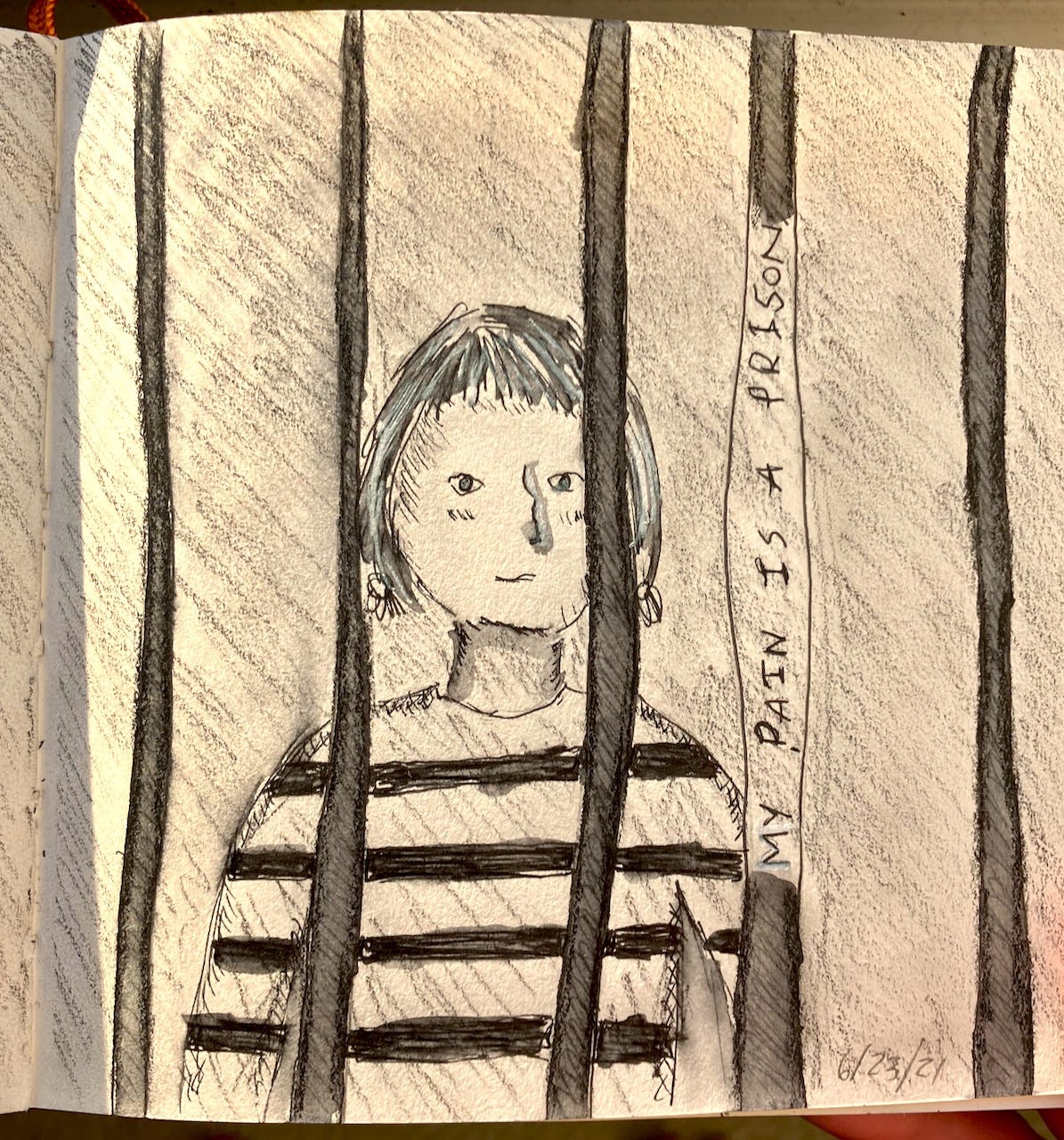Issue #40
Welcome! Thanks so much for tuning into Good and Beautiful Things each week.
I was just about to switch the podcast over to a music playlist when I heard these words:
“Tell me about the time you were seen.”
My interest piqued, I kept the podcast playing while I pedaled my bicycle along the path of crushed leaves.
The podcast episode was a conversation between Kate Bowler, and her guest, author and columnist for The New York Times, David Brooks. Brooks was explaining that as part of the research for his latest book1 he’d gone around the country asking people to share a story about a time they’d felt seen.
That was when the interview faded away and I began to hunt through my memories for my own answer to his question.
Feeling seen hasn’t been a big part of my experience as a woman in my mid-forties. Actually, feeling seen hasn’t been a big part of my experience as a human.
I thought about the first time I was pregnant and how I’d felt seen for those brief months. And then the baby arrived and I disappeared while everyone’s attention shifted to the newly minted bundle in my arms. Even I couldn't see myself for the first year of motherhood. Or maybe the first ten.
The voice of Kate Bowler interrupted my thoughts as I heard her talking about the German theologian, Jürgen Moltmann:
“And he’d been in a prisoner-of-war camp and was trying to reconstitute his sense of self after his youth had been destroyed…and his sense of identity. And we talked about his wife…
He was such an old man when he said it, he was so cute. He’s like, ‘Well, I’m not loved because I am so handsome’…and you see his cute little scraggly eyebrows and stuff…’but when she looks at me, I am beheld.’“
Now I found myself not only searching for a time that I’d felt seen but also a time I’d felt—beheld. The need to find the answer seemed urgent. And that’s when I stopped pedaling, switched the podcast off and turned the music on.
///
The Time I was Seen (Part 1)
A few days later I told my husband that I’d been feeling better for ten days straight, that I hadn’t taken Tylenol during the day for that entire length of time. It was the longest stretch of days that I’d felt good in my six years with chronic pain. And it was certainly the longest I’d gone without Tylenol.2
I realized that without the pain, my mind and body felt untethered, like a bird ready to lift into the air. It was only by experiencing the absence of pain that I could now see just how much I’d felt like a bird in a cage with damaged wings.
During the past two weeks, my heart had been soaring, searching for travel adventures that might soon be possible. Could I finally kayak the Grand Canyon? While listening to a podcast of pain recovery stories, I’d heard about a woman who was bound to a wheelchair but as her pain and fatigue improved she went to Iceland and rode a horse across lava fields. Until that moment I hadn’t known riding across lava fields was a thing but hearing stories like this, my future widened further. By the end of the ten days I was fairly buzzing with possibility.
I was also terrified.
I was afraid of the pressure I’d put on myself if I was truly headed toward a life no longer defined by pain. Would I expect myself to follow the big dreams that I’d buried in the ground when pain took over my life? Would I pressure myself in relationships if pain was not there to form the boundaries? If possibility was ahead, was failure ahead as well?
I could feel the anxiety and pressure reforming the bars of the cage around me.
As I shared all of this with my husband, he answered me without hesitation.
“You are already doing big things,” he said. “You don’t have to do anything else. If you don’t have pain, you get to actually enjoy what you’re already doing. Just stay curious.3”
He spoke with complete certainty of what he sees in me. He’s been with me through every high and low of this pain story and through his words, I was able to see a vision of myself through his eyes.
I saw myself biking past the Eiffel tower on a trip that seemed impossible (but I did it anyway).
I saw myself showing up to the work of healing from years of trauma and fear.
I saw myself pursuing art and writing, forty-eight issues of this Substack newsletter now behind me.
I saw the courage and strength in me that God has revealed over the last several years. I saw that my husband was right, I was already doing big things.
You don’t have to do anything else. You get to actually enjoy what you’re already doing.
I’m already doing enough.
As someone who has lived with the opposite belief for most of my life, I heard the words as an invitation to leave the pressure behind.
Through his eyes, I saw the cage bars around me shimmer. They’re not gone, but they’re no longer solid either.
///
The Time I was Seen (Part 2)
The truth is my husband is known at our house for staring at me. And I’ve never been very good at accepting his gaze. Or the smile on his face when I look over at him and catch him staring. And everyone in our family of six knows what’s coming next.
“You’re beautiful.”
He tends to say these words at the most unbelievable moments, though I’m not sure there is an easily believable moment for me.
Pre-birth, post-pregnancy, anxiety-ridden, sweaty and disheveled after a bike ride, all the silhouettes I’ve worn over the decades, even that haircut that was so bad I covered it with a scarf for three weeks.
His words come most often in the everyday moments when I feel anything but beautiful.
Twenty Five Years of “You’re Beautiful” You say the words, the familiar syllables from decades of repetition and I say- you're crazy. Crazy yes, but you’re my crazy and your words, those familiar words, push through layer after layer until, even if only as a faint echo- I hear them. And maybe (just maybe) yes, maybe I believe them, those familiar words– at least through those crazy eyes of yours.
///
“Tell me about a time you were seen.”
When I first heard this prompt as I pedaled along on that Fall morning bike ride, I felt a certain panic. Will I find even one moment that answers this question?
It turns out there was really no reason to panic. Thinking through these moments with my husband unlocked a door and other memories have been showing up to the party: the friends who have seen me over the years, that moment when the gaze of one of my children broke through the mom veil and saw the whole me, and all of the times that God has seen me when I felt entirely cloaked in darkness.
In the interview with Kate Bowler, David Brooks talks about “diminishers” and “illuminators”.
“-to be a good conversationalist is super essential. But before you get to that, you have to be really good at gazing at the person. You have to bring the right kind of attention. If I bring a cold, or objective attention to you, you’ll feel cold and objective. But if I bring a warm and loving attention, you will bloom.”
My husband is an illuminator and I can only hope that some of his gaze has rubbed off on me and I can be one, too.
Continue the Journey
Checkout the podcast episode that inspired this post:
If you’d like to support the writing and art that I create for this newsletter, you can now contribute to my art supply fund through “Buy me a Coffee”!
Blessings from the Guest Nest,
-Aimee
P.S.-I’d love to hear about a moment that you felt seen. Join me in the comments.
How to Know a Person: The Art of Seeing Others Deeply and Being Deeply Seen
The pain did come back but it’s fueled my hope that a full recovery is possible.
This is not my husband’s typical phrasing. The fact that he used the phrase “stay curious” only emphasizes how closely he’s been tracking with me.








beautiful, beautiful. I could have written your few lines about not being seen myself. This will prompt me to reflect on when I have been. thank you.
Your writing is beautiful and tender. You write like a friend along the way. I’m glad to have found you here. And I think people value your writing because, in a way, that kindred way you make them feel is a form of being seen and understood. ❤️